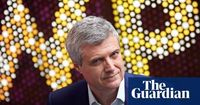Mark Read, the Chief Executive Officer of WPP, is set to step down at the end of 2025, concluding a remarkable tenure of more than 30 years with the advertising giant, including seven years at the helm. The announcement, made on June 9, 2025, signals the end of an era for WPP, a company that has undergone significant transformation under Read's leadership amid a rapidly evolving marketing landscape.
Read's decision to retire comes at a challenging time for WPP, which has faced a series of hurdles including a slide in earnings, the loss of its status as the world's largest advertising holding company, and the rising influence of artificial intelligence (AI) in the marketing sector. Despite these obstacles, Read's impact on the company is undeniable, having steered WPP through volatile market conditions, including the Covid-19 pandemic and the cost-of-living crisis, while positioning it at the forefront of technological innovation in advertising.
Philip Jansen, the Chair of WPP and former CEO of BT, expressed gratitude for Read's contributions, highlighting his pivotal role in transforming WPP into a "world leader in modern marketing services, with deep AI, data and technology capabilities, global presence and unrivalled creative talent." Jansen noted that Read will remain as CEO until December 31, 2025, to ensure a smooth transition as the company embarks on the search for his successor.
When Read assumed the CEO role in 2018, succeeding Sir Martin Sorrell, he embarked on a mission to build a "simpler, stronger business" that infused new energy into WPP's creativity and performance, powered by cutting-edge technology. Under his guidance, the company consolidated its media and creative agency brands, rebranded its media investment arm GroupM to WPP Media, and launched innovative AI-driven tools like Open Intelligence and WPP Open, designed to enhance efficiency and creativity for clients.
Read acknowledged the transformative impact of AI on the advertising industry, stating at the inaugural SXSW London event in June 2025 that "there is no doubt" that AI-driven efficiencies will reduce the number of people involved in media work. This candid admission underscores the challenges WPP faces in adapting to technological disruption while maintaining its creative edge.
Despite recent difficulties, including a decline in share price to a four-year low and the loss of several top global clients to competitors like Publicis Groupe and Omnicom, Read remains proud of the progress made. He emphasized that WPP now works with four of the world's five most valuable companies and that revenues with its biggest clients have grown consistently. The company was also named Creative Company of the Year at Cannes Lions in 2024, a testament to its enduring creative prowess.
However, the road ahead is fraught with challenges. WPP's share price has lost about half its value during Read's leadership, reflecting investor concerns about the company's ability to keep pace with tech-savvy rivals and the growing dominance of digital platforms like Google, Meta, and Amazon in the advertising space. Meta's recent announcement to assist advertisers in fully creating and targeting campaigns using AI tools exemplifies the competitive pressure WPP faces.
The appointment of Philip Jansen as chairman earlier this year was widely seen as a harbinger of change, with insiders describing him as a "change agent" who quickly began assessing the company's operations and identifying areas of administrative bloat. While Jansen and Read reportedly maintained a good working relationship, the leadership transition was anticipated, given the need for fresh strategies to address WPP's stagnation and intensifying market competition.
WPP is currently undergoing a wide-ranging reorganisation of its media business, which once fueled its ascent to the top of the advertising world. Read has openly admitted that WPP Media has underperformed compared to rivals, signaling the urgency for strategic renewal. The company also faces the possibility of losing significant accounts, such as the Mars media business, which is reportedly under review.
The search for Read's successor is underway, with WPP considering both internal and external candidates. Notably, the company's largest operations are in the US, while prominent internal candidates are based in London, presenting a geographical and strategic challenge for the board. The prolonged exit process, while intended to preserve stability, carries risks of destabilisation during a critical period for the company.
Reflecting on his tenure, Read expressed deep appreciation for the people who contributed to WPP's achievements, saying, "It has been an immense privilege to serve as CEO for the past seven years. When I took on this role, our mission was to build a simpler, stronger business, and put structure and new energy behind our creativity and performance, powered by world-leading technology. I am proud that our teams across the business have delivered that exceptionally well." He also highlighted the company's leadership in AI, noting that with the full launch of WPP Open in 2025, "we are now leading the way as AI transforms marketing."
As Read prepares to explore the next chapter of his life, the advertising world watches closely. His departure marks a pivotal moment for WPP, a company at the crossroads of tradition and innovation, creativity and technology, legacy and transformation. The challenge for his successor will be to harness WPP's rich heritage while driving the company boldly into the future of marketing.



